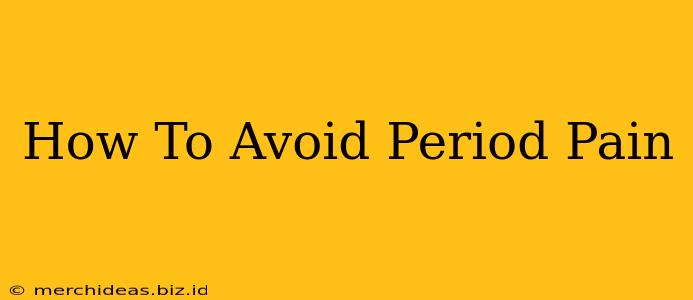Period pain, or dysmenorrhea, is a common experience for many women, but it doesn't have to be debilitating. While some discomfort is normal, intense cramping and other symptoms can significantly impact your daily life. Fortunately, there are many ways to alleviate period pain and make your cycle more comfortable. This guide explores effective strategies to avoid or minimize period pain, empowering you to take control of your menstrual health.
Understanding Period Pain: Causes and Symptoms
Before diving into solutions, it's helpful to understand what causes period pain. The primary culprit is prostaglandins, hormone-like substances released by the uterus during menstruation. These chemicals cause the uterine muscles to contract, leading to cramping. High levels of prostaglandins are often associated with more severe pain.
Other symptoms accompanying period pain can include:
- Lower abdominal cramps: This is the most common symptom, often described as sharp, throbbing, or aching pain.
- Lower back pain: Pain may radiate to the lower back and thighs.
- Headaches: Migraines or tension headaches are common during menstruation.
- Nausea and vomiting: Some women experience gastrointestinal distress.
- Fatigue and mood swings: Hormonal fluctuations can lead to tiredness and emotional changes.
- Bloating: Fluid retention contributes to abdominal bloating and discomfort.
Natural Ways to Avoid Period Pain
Many effective methods for managing period pain don't involve medication. These natural approaches can significantly reduce discomfort and improve overall well-being:
1. Heat Therapy: Soothe Away the Cramps
Applying heat to your abdomen or lower back can relax uterine muscles and ease cramping. Hot water bottles, heating pads, or even a warm bath or shower can provide significant relief.
2. Exercise: Gentle Movement Makes a Difference
While intense workouts might not be ideal during your period, gentle exercise like yoga, walking, or swimming can actually help reduce pain. Physical activity boosts endorphins, natural mood boosters that also have pain-relieving effects.
3. Healthy Diet: Fuel Your Body for Comfort
A balanced diet plays a crucial role in managing period pain. Focus on consuming foods rich in magnesium, calcium, and iron, such as leafy greens, nuts, and seeds. Reducing your intake of processed foods, caffeine, and alcohol can also make a difference. Staying well-hydrated is also vital.
4. Stress Management: Mind and Body Connection
Stress can exacerbate period pain. Practicing stress-reduction techniques like meditation, deep breathing exercises, or yoga can promote relaxation and reduce discomfort.
5. Over-the-Counter Pain Relievers: Effective First-Line Treatment
Nonsteroidal anti-inflammatory drugs (NSAIDs) such as ibuprofen or naproxen are effective in reducing period pain by inhibiting prostaglandin production. Always follow the recommended dosage instructions.
When to See a Doctor
While many strategies can effectively manage period pain, it's crucial to consult a doctor if:
- Your pain is severe and interferes with your daily activities.
- You experience heavy bleeding or unusual bleeding.
- Your pain worsens over time.
- Over-the-counter pain relievers provide little or no relief.
Your doctor can help determine the underlying cause of your pain and recommend appropriate treatment options, which may include prescription medications or other interventions.
Conclusion: Taking Control of Your Menstrual Health
Period pain doesn't have to control your life. By adopting a holistic approach encompassing lifestyle changes, natural remedies, and appropriate medical care, you can significantly reduce discomfort and improve your overall well-being during your menstrual cycle. Remember, seeking support from your healthcare provider is crucial if your pain is severe or persistent. Empower yourself to manage your menstrual health and enjoy a more comfortable and fulfilling life.
